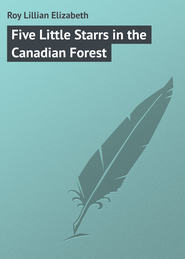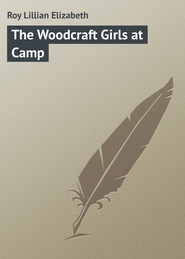По всем вопросам обращайтесь на: info@litportal.ru
(©) 2003-2024.
✖
Girl Scouts in the Rockies
Автор
Год написания книги
2017
Настройки чтения
Размер шрифта
Высота строк
Поля
“Is it named Gory, Gilly, because so many Red Men scalped the early settlers out here?” asked Betty.
“Oh, no,” laughed Mr. Gilroy. “It is named after an Irish nobleman, Sir George Goré, who discovered the canyon while he and a party of friends were hunting big game in the Rockies many years ago, before folks went over the Divide. In those days it was considered a marvelous feat to go into the Rockies.”
“If every one can have a mountain named after them, why can’t I have one called ‘Juliet’s Peak’?” demanded the irrepressible scout.
“You can, if you like. That is the easiest part of all, but how will other tourists know that that particular peak is named for you?” laughed Mr. Gilroy.
“You’d have to advertise the fact by some wild adventure, or great patriotic deed,” added Mr. Vernon.
“Oh, I can advertise, all right!” retorted Julie. “I’ll take a great bucket of whitewash and a calcimine brush; then on every flat-faced rock along the trail, up one side and down the other, I’ll slap a hand-painted sign on every one of them: ‘This is Juliet’s Peak,’ and the finger in ghostly white will point to my peak.”
Her ridiculous explanation caused every one to laugh, but when Jolt turned and opened his jaw wide to emit the grating sound “Hee – haw! Hee – haw!” the riders declared it was screamingly opportune of the mule.
Late in the afternoon, the second day from Flat Top, the scouts had their first battle with a rattlesnake. It is claimed that one never sees a rattler on the east slope of the Rockies, – why, it is not stated. But one certainly encounters many of them on the west side and on other ranges in Colorado.
They were jogging along comfortably when Julie’s horse suddenly leaped aside and climbed a steep bank beside the trail. The other horses trembled, and instantly the warning rattle sounded. Tally hurried back and saw a huge reptile coiled at one side of the trail, half-hidden under a bush.
He jumped from the saddle and snapped a hickory stick from a young sapling nearby. Then he whipped the rattler over the back. He could not break its back as the bush fended the blows. But Omney and Tally could so tire the reptile with blows that kept its head swinging from side to side, that finally they might jump on it.
The scouts sat and watched this interesting fight, the rattler darting its forked tongue venomously at the sticks, and in so doing having to turn its head from one to the other. This defence kept it from uncoiling and gliding away. Neither could it spring from the coil to strike while its head was so busy.
At last it showed signs of weariness, and once, when it momentarily forgot to strike at Tally’s whip but struck twice in succession at the stick Omney wielded, the former took instant advantage of it, and in another moment his heel was planted upon the flat head.
Then the guides dragged the sinuous reptile out and measured it. It was fully five feet long, from head to tip of tail where ten rattles were attached. Tally removed these, and with a bow presented them to the Captain, – an honor shown all Tenderfeet in the Rockies, if a rattler is encountered by the natives.
“Him make fine money book, er belt,” suggested Omney, when the scouts shuddered at the diamond-backed rattler.
“Oh, yes, we must send the skin home to be cured and made into souvenirs, girls!” exclaimed Mr. Gilroy.
In vain did the riders look for other rattlers after that, for every one wanted every skin that could be gotten for souvenirs.
Mr. Gilroy rode along, watching for the familiar landmarks that would tell him he had found Meadow Fork, but he finally admitted that he must have taken the wrong turn back by the ranch.
They rode past lovely streams and camped beside a most enchanting lake, then on, alongside a fine river, but Mr. Gilroy did not find his Meadow Fork or Grand Lake.
Finally, from the summit of one of the lower peaks on the western slope of the Rockies, the scouts saw a valley spread out before them, and concentrated in one spot of this valley were numerous dots, that were dwelling-houses, together with several large ones, that denoted they were hotels.
Mr. Gilroy rubbed his eyes, then stared. “Now, if I did not know better, I’d swear that that was Sulphur Springs.”
“’Tis Sp’ings,” chuckled Tally.
“But, Tally, it can’t be! We haven’t found Meadow Fork or Grand River, yet! Have we trailed along some other way?” wondered Mr. Gilroy.
The town proved to be the Springs, and there Mr. Gilroy learned that he had been riding along Meadow Fork, had camped at Grand Lake, and then followed Grand River, without knowing it. This error in judgment gave the scouts a never-ending chance for teasing him, thereafter.
That night the horses, as well as their riders, were glad to stretch out upon comfortable town-made beds, and in the morning the breakfast was already provided for all, instead of their having to first gather it.
The first thing the guides did after breakfast was to cash in their reward for Devil-Bear. The skin proved their claim, and word instantly circulated that two Indians had killed the menace of the ranches. The scouts received the reward for the tongues of the timber-wolves which Tally had brought into town, and thus the scouting party soon found fame camping on their doorstep. The local papers made much of them, and the girls took a keen delight in mailing home copies of the papers containing the account of their exploits.
CHAPTER THIRTEEN – A FOREST FIRE
“Now, friends, let us get away as soon as possible, or the guides may spend all their reward money on firewater, and be unable to start for a week,” suggested Mr. Gilroy, confidentially, to the scouts.
“Why don’t you take the money and deposit it for them in a bank?” asked Julie.
“I offered to keep it for them, but they were not overanxious to part with the cash. I know the boys too well to dream that they can withstand temptations of a town when they have such easy money to burn.”
So the riders planned to leave immediately, starting away soon after the midday meal.
“I’m not sorry to leave the Springs with its ailing visitors behind,” remarked Joan, as they got back into the saddles.
“Thank goodness we are not rheumatic, or gone to pieces, to have to come here to be mended again,” declared Julie.
“I should think the horrid water would kill them, instead of curing,” added Ruth, making a wry face at the remembrance of her taste of the waters.
“It isn’t the water that cures, remember,” said Mr. Gilroy, “it is the people’s faith in it. And some folks believe that the more disagreeable a cure tastes, the better it will act.”
From Hot Sulphur Springs the party rode through Goré Canyon, and then over the Goré Range, as Mr. Gilroy had planned. The climb up the latter mountains was one of the thrilling experiences of the trip.
Following Tally through an unbroken wilderness, they unexpectedly came upon an old lumber-road. Along this they trailed until it ended in a natural clearing of over a thousand acres. The park was surrounded by dense forests with apparently no trail leading from it.
“Here we are, boys! In, all right, but no way out,” called Mr. Vernon, smiling at the perplexed looks of the riders.
“That means that every one has to hunt for a blaze of some kind,” returned Mrs. Vernon.
“The blazes are here, all right, but the trail is such an old one that the young timber has, likely, grown up and hidden the old pines which carry the signs,” added Mr. Gilroy.
Thereupon, every scout began to thrash through bushes and between young trees, hunting for the much-desired blaze. It was Betty’s luck to find it, although she really wasn’t looking as anxiously for it as were the other scouts.
She saw a queer scar on an old pine before her when she broke through some brush, and she was studying its strange formation when Tally came up behind her. He recognized the blaze and laughed.
“Betty find him! Come see!” shouted he.
The others galloped across the park and stared at the deeply scarred pine, while Tally read its meaning to them.
“It must have been blazed in the days of the First People,” said Julie.
But little attention was paid her remark, as every one was eager to go on. Tally broke a way through the jungle of bush and young timber, and finally they all came out to the silent woods again.
They rode through twilight forests of gigantic red-spruce trees, measuring from three to six feet in diameter and towering over a hundred feet in height. The ground under these was carpeted with pine needles, which lay, year after year, until no sound echoed from the hoofbeats upon them.
Looking in any direction, the scouts could see only dense forests, with not a crevice in their vaulted roofs of green where the sun might filter through. These pines seemed to waft down virgin incense upon the heads of the riders, who fully appreciated the still beauty of the place, and the velvety corridors they went along.
Then the trail became steeper, and the trees grew smaller, allowing great splashes of sunshine to bask here and there upon the passive treetrunks, or to sprawl out upon the thick pine needles that covered the ground.
After riding for several hours, the scouts left the pine forest behind, and rode out upon a faint trail that ran through aspen brakes. Now and then they came to parks where the trail lost itself, and every one had to seek for it again.
A great deal of time was lost in each park they came to, over thus finding the trail, as so many misleading ones were made in the thick buffalo grass by wild animals that came to graze there. The only thing Tally relied upon for the right way was by finding a blaze upon an old tree nearby.











